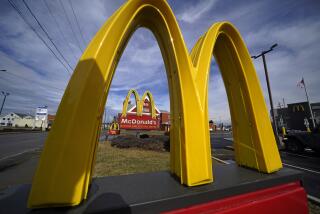As FDA probes source of national E. coli outbreak, California firm recalls onion products

- Share via
As the U.S. Food and Drug Administration investigates an E. coli outbreak associated with McDonald’s Quarter Pounders, major restaurant chains and food distributors are pulling raw sliced onions produced by Salinas, Calif.-based Taylor Farms.
As of Friday, officials from the Centers for Disease Control and Prevention said 75 people had been sickened and one person had died. The outbreak spans 12 states, with Colorado and Nebraska reporting the largest numbers of people fallen ill.
Burger King and Yum!Foods pulled onions from their restaurants and products Thursday. Yum!Foods owns Taco Bell, Kentucky Fried Chicken, Habit Burger & Grill, and Pizza Hut.
U.S. Foods, a major food processor and distributor, notified customers that the international food production giant Taylor Farms had announced a recall on four onion products “due to potential E. coli contamination.”
McDonald’s has also pulled the onions, although it’s unclear whether those onions were sourced from Taylor Farms.
Dairy industry experts say the virus entered California after local cows were shipped to another state and then returned to California.
Jannell Goodwin, a spokeswoman for the FDA, said no product has yet been determined to be the source of the outbreak.
“Investigators are working to determine if the slivered onions or beef patties on Quarter Pounder burgers are the likely source of contamination,” the agency said in a statement.
The CDC noted on its website that Taylor Farms initiated a voluntary recall of “some onions” and as a result, the risk to the public is very low.
Other states where people have become ill include Kansas, Utah, Wyoming, and portions of Idaho, Iowa, Missouri, Montana, Nevada, New Mexico, and Oklahoma. McDonald’s has stopped its current supply of Quarter Pounders to these states.
Bill Marler, a food safety attorney — who is representing two women from Nebraska who became ill in the outbreak — said dealing with “contaminated onions is becoming a bigger and bigger problem.”
He said he’d been involved in a 2015 case that involved vegetables grown by Taylor Farms — which he described as one of the largest growers and processors of vegetables in the country. The company has production plants in the U.S., Canada and Mexico.
In that case, a celery-onion mix used in Costco chicken salad was causing people to get sick.
He said that although the number of people involved wasn’t as large as the current McDonald’s outbreak, one of his clients required a kidney transplant because of the infection.
“This is an interesting outbreak,” he said of the McDonald’s incidents.
“They have a pretty damn clean record,” he said.
As the range and incidence of valley fever grows, public health officials are struggling to warn visitors of the risk.
Marler said such outbreaks are often associated with contaminated water.
“Anytime you have an E. coli outbreak or salmonella outbreak, there’s going to be some animal nearby. Usually a cow,” he said.
Those animals may have contaminated the water used for irrigation, or “they’re growing onions too close to a cattle feed lot, or something like that. Especially E. coli 157. You’re always going to find a cow nearby.”
Taylor Farms did not respond to a request for comment.
Marler also said it was very unlikely there would be a multi-state outbreak of E. coli from beef.
“That would mean you’re undercooking hamburger in multiple locations,” he said.
The CDC noted on its website that Quarter Pounder hamburgers are temporarily not available in some states while the fast food chain makes supply changes. It also said the company is working proactively with government investigators to confirm the contaminated ingredient.
The agency said that Quarter Pounder beef patties and onions are unique to that sandwich, and not used in other menu items.
They also urged anyone who thinks they may have E. coli poisoning to see a doctor.
Symptoms, which usually appear three or four days after consuming the bacteria, include severe stomach cramps, diarrhea (often bloody), and vomiting. Most people recover within a week.
CDC officials say some people can develop serious kidney problems, and may need to be hospitalized.









